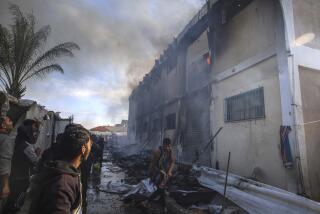Court for Sierra Leone Gets U.N. Go-Ahead
- Share via
UNITED NATIONS — The Security Council voted unanimously Monday to create a court aimed at prosecuting rebel leaders in Sierra Leone suspected of killing and maiming tens of thousands of helpless civilians.
“We hope that those people who have constantly violated all the rules of national and international behavior, who have committed such gross violations of human rights, will understand that the noose continues to tighten around them,” U.S. Ambassador Richard Holbrooke said.
Sierra Leonean U.N. Ambassador Ibrahim Kamara called the council’s action “a very, very bold step . . . forward in bringing sanity” to the country.
The resolution authorizes U.N. Secretary-General Kofi Annan to negotiate an agreement with the Sierra Leonean government to create an independent special court to prosecute crimes against humanity, war crimes and other serious violations of both international humanitarian and Sierra Leonean laws.
Annan has 30 days to make recommendations on the type of tribunal and an appeals court. The council also asked him to suggest an alternative country for the court if it cannot be based in Sierra Leone.
The council stressed that establishing a credible system of justice and accountability for crimes committed in Sierra Leone “would end impunity and would contribute to the process of national reconciliation and to the restoration and maintenance of peace.”
The court is clearly aimed at rebel leaders of the Revolutionary United Front, or RUF, who have been blamed for the brutal killings and atrocities during Sierra Leone’s nine-year civil war.
The resolution does not mention the rebel group but does refer to a June 12 letter from Sierra Leonean President Ahmad Tejan Kabbah in which he asked the Security Council to create a court to prosecute the rebel leadership.
RUF leader Foday Sankoh signed a July 1999 peace agreement with Kabbah’s government but reignited the war in May, taking about 500 U.N. peacekeepers hostage. The peace accord gave Sankoh and his rebels amnesty for crimes committed before July 1999.
The resolution notes, however, that amnesty did not apply to genocide, crimes against humanity, war crimes and other serious violations of international humanitarian law.
Sankoh was captured in May and would probably be one of the first rebels brought to trial.
In early July, the Security Council banned the purchase of Sierra Leonean diamonds without a government certificate in a bid to strangle the ability of the rebels to finance the war using “blood diamonds.”
The council is also expected to beef up the 13,000-strong U.N. peacekeeping force in Sierra Leone after receiving a recommendation from Annan in the next few weeks.
More to Read
Sign up for Essential California
The most important California stories and recommendations in your inbox every morning.
You may occasionally receive promotional content from the Los Angeles Times.












